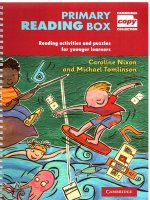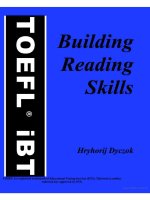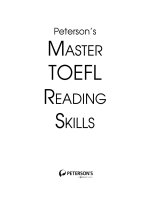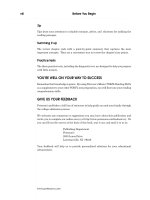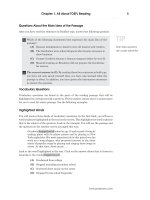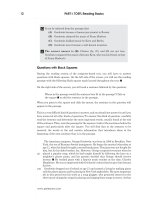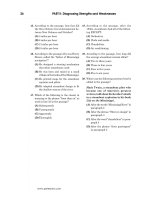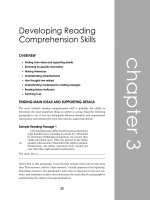3fidge louis primary foundation skills reading
Bạn đang xem bản rút gọn của tài liệu. Xem và tải ngay bản đầy đủ của tài liệu tại đây (6.75 MB, 48 trang )
Comprehension
Louis Fidge
•
Comprehension
Louis Fidge
"
MACMILLAN FOUNDATION SKILLS
Contents
Page
Skills, Scope and Sequence
2
Teacher's Notes - Introduction to the series
4
Teaching features of the books
5
Unit 1
Hen, Rat and Cat
6
Unit 2
How to use an information book
8
Unit 3
The kind old man and the robber
10
Unit 4
How we get our milk
12
Unit 5
Five little spacemen
14
Unit 6
Johnny Appleseed
16
Unit 7
The fox and the crow
18
Unit 8
Hansel and Gretel
20
Unit 9
Tall trees
22
Unit 10
The story of Louis Braille
24
Unit 11
Ug and Og
26
Unit 12
The blackbird
28
Unit 13
A letter to a pen friend
30
Unit 14
The boy who had no friends
32
Unit 15
School rules
34
Unit 16
The bully
36
Unit 17
The dentist
38
Unit 18
Some poems to enjoy
40
Unit 19
The elephant and the kitten
42
Unit 20
The old lizard
44
Glossary
46
Skills, Scope and Sequence
Unit 1
Text Type
Text Level
Sentence Level
Word Level
Hen, Rat and Cat
Play/Traditional story
Characterisation
Focus on verbs
Modifyin g e (magic e)
Unit 2
Text Type
Text Level
Sentence Level
Word Level
How to use an information book
Information/explanation
Features of text
General punctuation
Alphabetical order (second letter)
Unit 3
Text Type
Text Level
Sentence Level
Word Level
The kind old man and the robber
Adventure story with a moral
Sentence completion (multiple choice)
Focus on adjectives
Long vowel sound ea
Unit 4
Text Type
Text Level
Sentence Level
Word Level
How we get our milk
Information text (flow diagram)
Sequencing
Prepositions
Alphabetical order (first letter)
Unit 5
Text Type
Text Level
Sentence Level
Word Level
Five little spacemen
poem
Questions (literal/appreciative)
Simple present and past tenses
Compound words
Unit 6
Text Type
Text Level
Sentence Level
Word Level
Johnny Appleseed
Autobiographical
Questions (literal/evaluative)
Pluralisation of nouns es
Long vow el sou nd or
Unit 7
Text Type
Text Level
Sentence Level
Word Level
The fox and the crow
Fable
True/false statements
Indefinite article
Finding small words inside longer words
Unit 8
Text Type
Text Level
Sentence Level
Word Level
Hansel and Gretel
Fairy story
Questions (literal/inferential)
Question and exclamation marks
Long vowel sound au
Unit 9
Text Type
Text Level
Sentence Level
Word Level
Tall trees
Poem with familiar setting
Questions (literal)
Adjectives - opposites
Long and short sound of y
Unit 10
Text Type
Text Level
Sentence Level
Word Level
The story of Louis Braille
Autobiog raphy /i nformation
Matching sentence beginnings and endings
Conjunction and
Long vowel sounds oi/oy
Conve~ational
2
I
Unit 11
Text Type
Text Level
Sentence Level
Word Level
Ug and Og
Adventure story with a moral
Identifying errors in statements about story
Simple present and present continuous tense
Doubling final consonant before adding ing to verbs
Unit 12
Text Type
Text Level
Sentence Level
Word Level
The blackbird
Unit 13
Text Type
Text Level
Sentence Level
Word Level
A letter to a pen friend
Writing a letter/biographical
Sentence completion
Subject/verb agreement using is/are and was/were
Long vowel sound 00
Unit 14
Text Type
Text Level
Sentence Level
Word Level
The boy who had no friends
Adventure story in familiar setting
True/false statements
Simple present. simple past and past continuous tenses
Long and short sounds of ow
Unit 15
Text Type
Text Level
Sentence Level
Word Level
School rules
Instructions/persuasive writing
Questions (literal/inferential)
Punctuation - capital letters and full stops
Consonant digraph wh
Unit 16
Text Type
Text Level
Sentence Level
Word Level
The bully
Adventure story in familiar setting with a moral
Sequencing
Choosing correct form of past tense (irregular verbs)
Short saund of 00
Unit 17
Text Type
Text Level
Sentence Level
Word Level
The dentist
Recount/report
Questions (literal/inferential)
Matching questions and answers
Soft c as in ice
Unit 18
Text Type
Text Level
Sentence Level
Word Level
Some poems to enjoy .
Word play/tongue twisters/alliteration
Questions (literal/appreciative)
Pluralisation of nouns - change y to i add es
Syllabification
Unit 19
Text Type
Text Level
Sentence Level
Word Level
The elephant and the kitten
Adventure story
Questions (literal/evaluative)
Proper nouns
Double consonants within words
Unit 20
Text Type
Text Level
Sentence Level
Word Level
The old lizard
Story \o\~th patterned language/information
Questions (literal/inferential)
Focus on nouns
Long vowel sound oy
Conve~ational poem
Questions (literal/appreciative)
Commas in lists
Suffixing with Iy and ful
3
Teacher's Notes - 'I ntroduct ion to
the series
The texts
Each book in the series introduces pupils to a wide range of culturally appropriate text
types, including fiction, poetry and non-fiction . The books are carefully graded according
to readability and are incremental in difficulty. The books provide a valuable complement
to any other resources or series currently being used. The fact that each unit is structured
in the same way makes the books accessible and easy to use.
The related activities
The related activities support the development of essential reading skills at Text Level,
encouraging pupils to read at different levels using literal, inferential and evaluative
comprehension skills. The stimulus passages are also used to help pupils develop skills at
Sentence Level (grammar and punctuation) and Word Level (spelling and vocabulary).
The Skills, Scope and Seq.uence Chart
The Skills, Scope and Sequence Chart (on pages 2-3) provides an immediate overview of
text types included and skills being developed at Text, Sentence and Word Level. This
chart is very helpful for planning purposes.
Using the books
To gain maximum benefit from the books, it is suggested that they are used
systematically, working through each unit one at a time, in the given order. However, the
books may also be used flexibly, selecting units as desired to complement other work
being done in class.
Tackling the texts
The stimulus texts may be tackled in a variety of ways . They could be used for shared
reading . This could take the form of the teacher reading the whole text to the class or
inviting different pupils to contribute as appropriate. Certain texts, eg poems, provide an
ideal opportunity for whole class participation. Alternatively the pupils could be asked to
read the text silently or read it aloud in pairs or in groups . Whatever approach is used,
to make the most of each text it should be discussed to ensure pupils have a good grasp
of the literal meaning of the text and any vocabulary they may not have met before.
Key vocabulary words are printed in bold type, and the Teacher's Book indicates how
these might be dealt with . The related Text Level activities may initially be done as a
class verbally to help pupils reflect on the texts.
Tackling the related activities
The related activities at Text, Sentence and Word Level may be used systematically or
selectively as desired. It is suggested that prior to working any activity there is some
discussion with the pupils to ensure they understand what is required of them.
4
Teaching features of the books
Units of work
There are 20 double-page units of work . Each unit is structured in the same way, ie a
stimulus text, followed by three different levels of activities (Text, Sentence and Word
Level).
Text Level activities
(a range of differentiated
comprehens ion tasks)
Unit number and title
Sentence Level activities
(grammar or
punctuation tasks)
Hen, Rat and Cat
bod thfestory arid onl • • ' the ClUftU
below.
1 Who O~ the thrft' fT'IQin chorad
in the-story ?
2 What did Hen ask first?
3 What did Rot and Cot ons
• What is Hen making ?
5 Why did Rot and Cat
~ I wilW ot the end?
5 What do you think
ul Rot and Cat?
7 Do you think He
ill lei Rot ond Cot hove ony breocH
00 you help 01 hame l' What sort of job ... do you do ?
-"""
Cl U V"
Hen ; Who w ill hd p ", .. plLl"1
ItMo 'r-ed ' ?
Rot: I won't.
Co t: l wo n't .
Hen : Who will h elp me CUIthe
whect?
Rat: I won't.
Ca l: I won't .
Underline the Wfb in e-ach W'ftlence .
j ~ ~ ::~ ~ :tl~ :00:.
S
Fnends core about you
7
Friends to
~
Fnmds play wd h you.
ffif'n ds beip you,
Fnend5 6 tr n to ycv..
,
to you
D LrlR
Writ~ th~
1 Add . to I'" end 01 toc:h \IIIOtd..
d
g
Hen : Wh o will help m e m oke
Ral:
COl :
tub
top
h
l nol
th e brea d?
I won't .
I wo n ' I.
(0"«'
a
I W~ Q ha.l
b
I
I
f
I
mod
cub
•
2 Choow Ih.
word you malo• .
b cop
. t1op
a hoi hcte
c
rob
'
I
I
fliP
pn
""
word Cotill each gop .
on my heod . ~ hot I ho I!!')
of toolhpmlt!. (tub ' tubt)
you arc hcIpp'j' (hop , ,,~)
g,pl wolef 'tOm 0
(lop ' Io pr)
0 eeee. (mod I mcdtoJ
my finger. (cull CUll')
Q
Hen : Who will h elp me ec t the
b rea d ?
Rot: I w ill i
Co t: I will!
Glossary of Language Terms
....
~_
......
~
.. "
_
~.....
Text for reading and
discussion
Word Level activities
(spelling and
vocabulary tasks)
-,.
~ , ..
l:hoo _
JV1
-n _ ..
.. _
~
.. """,, """ """
__
"""'-rt_ _
000 1 _
... 11>o _
...
~.
-oOIot-
=-,--_.-r€--"
5
,. . . . . . . . -
A -....,..d .... .
~ "' -u . .......
... . . - . - .........
-_
~
_
~
lIlI"::
.....
c..r-=.;..:;;:::.::-;:z:
'ell ...
~"':':' l
a - - "'....,.- ..
...."""_
-,.....
. - "'__
•
-"' - _- "-1
""'"",,.,,..
llhor"' rlrryfN ou._ _'
_
... .
:::::;'::'::"-.
. 1 ......-. ....,.. _ .-""" _......
JiIoII
~
I -=~:,r=::...
~ =~--~~~~
i=:.::-:;:;,.......-
'''rr:.;.-:-.:.....~.:,
, .~ ':=." ..
~ ':' ~
1_",=:::::::=::;,__ '" I"":....~, = ~_ -.
0
" " ' - _l lI
"'---' _~ """
... ~ h
_
_ -
~
_
~
(1ooof_
bit
._11
'- I _~
_ " IIw _ _ ...
. _'"
OI _
....... ... _
""""'_
,... -
1I
"'"""
0..-'" 0l0P0001l..
... . - . . . . , .
...
....,
_..
~
0 1 .. .....- ..... 01
lI~
bor. -)
•
.:
'"
_
- p-':"' -/tdtt_
". -.;1
_
'
h_
,
....l o _
_
46
IIboo
_~
_
._
_
001 Ihr _ _
._,_tidittq
-:::=
'== "')-''''*''iI
i:l[il!l1P'
........
_ "a,.....
, ,,
...,.-.."
.. __ ..... '''''
,.......
5
, ..... _
"' ~ -.d
~t .
_.. _11» _ . . ., __.
This explains and gives examples of key language
terms and concepts covered in the activities. The
Glossary may be used for teaching purposes or for
reference by pupils.
.
~~ ::.:=~ - _
:=':-",-"":;;--",- '..
e - OUO ..-a..-l
The Glossary
_
"--~-u
"' ~ _.
c.=:.' ::= :--...== =~ ....
e_- - _
,.,..
..... ... _ _ ... ..I
~
.tItII .... OI'OOl
~ _
.... M. .-.u:
~
l.. ~
""?- -*' . ...... IttI ..
_ . - ...y u., _ . ............
1......
rt..
-""._,..
n._.__ . .. "'"'" "_
...... _ "'...... _ ..
~ - " O"""
--..
...A.no
..... ... ,,
~ ~
~ _
,
........
,.._,
)
:~£~~.;
_ _.,
_ ....-...4
~....,
Hen, Rat and Cat
Do you help at home? What sort of jobs do you do? .
Hen: Who will help me plant
the seeds?
Rat: I won't.
Cat: I won't.
Hen:
Rat:
Cat:
Hen: Who will help me make
the flour?
Rat: I won't.
Cat: I won't.
Hen:
Rat:
Cat:
Hen : Who will help me bake
the bread?
Rat: I won't.
Cat: I won't.
Hen:
Rat:
Cat:
6
Who will help me cut the
wheat?
I won't.
I won't.
Who will help me make
the bread?
I won't.
I won't.
Who will help me eat the
bread?
.I will!
I will!
EL
Read the story and answer the q.uestions below.
1
2
3
4
5
6
7
Who are the three main characters in the story?
What did Hen ask first?
What did Rat and Cat answer?
What is Hen making?
Why did Rat and Cat say I will!" at the end?
What do you think about Rat and Cat?
Do you think Hen will let Rat and Cat have any bread?
U
s
Underline the verb in each sentence.
1
3
5
7
Friends laugh with you .
Friends share with you.
Friends care about you.
Friends talk to you.
1
Add e to the end of each word. Write the word you make.
a
d
g
j
2
hat
tub
tap
not
h.a.te
b
e
h
k
2
4
6
Friends play with you .
Friends help you.
Friends listen to you.
cop
hop
mad
cub
c
f
rob
pip
pin
cut
Choose the correct word to fill each gap.
a
b
c
d
e
f
I wear a h.a.t on my head. (hat / hate)
I have a
of toothpaste. (tub / tube)
I
you are happy. (hop / hope)
You get water from a
. (tap / tape)
I
a cake. (mad / made)
I
my finger. (cut / cute)
7
How to use an
information book
A story book is called a fiction book. Stories are not true.
Information books are called non-fiction books.
They are full of facts.
~ .~
Here are some pages from an
information book on shops. A
Contents Page comes at the front of
the book. It tells you what sections the
book is divided into.
G.. .\l(i'~r,.~.\
I
Index
page
Contents
baker
butcher
chemist
department store
greengrocer
market
post office
supermarket
page
What are shops?
Big shops
-Smull shops
Markets
Quiz
The Index comes near
the back of the book. It
tells you where you can
find different things.
2
4
6
10
12
, - _- - - ":0-..
8
6,8,12
7,9, 12
7, 9
4, 5
6,8,12
10, II, 12
7,9,12
4, 5
Read the information and answer the questions below.
1 What is the difference between a story book and an information
book?
2 Where will you find the contents page of a book?
3 What does a contents page tell you?
4 On which page of the book will you find the section on markets?
5 Where will you find the index of a book?
6 What does an index tell you?
7 On which pages of the book will you find information on
department stores?
Copy these sentences. Punctuate them correctly.
1 we need water to live
We need wa.ter to live.
2 can you swim
3 we use water for swimming washing drinking and cooking
4 in the sea the waves can be very strong
5 is it raining outside
6 look out a crocodile is coming
7 Come here Anna
8 I want an apple a red apple.
Write these words in alphabetical orde r.
1 butcher, baker baker. butcher
2 mess, market, mop
3 whale, wet, water
4 helicopter, hurry, harbour
5 submarine, swim, ship
6 paddle, pond, pen
7 train, think, tap, today
9
The kind old man and
the robber
What is a robber? What do you think about robbers?
One night a man went to rob a house.
The robber found many fine clothes inside the house. Then he heard
someone come in the front door. It was an old man.
0
THe robber was surprised when the old man helped him carry the
clothes.
The clothes were heavy. The old man got tired. The robber shouted at
him.
When they got to the robber's house, the robber gave the old man
some of the clothes and told him to go away.
The old man gave the clothes back to the robber. He said, "The house
you robbed was my house. You must be very poor if you have to steal
clothes. Please keep all the clothes. If you want any more, come and
see me again."
The robber ~ surprised that the old man was so kind. It made
him feel-very scd. The robber told the old man he was very sorry.
After that the robber lived a better life.
10
Think of a suitable word to fill each gap .
1 The robber found many fine
in the house.
2 The robber heard someone come in the
door.
3 The old man
the robber.
4 When the old man got tired the robber
at him.
5 The robber told the old ma n to
away.
6 The old man was very
to the robber.
7 The robber said that he was
_
1
Underline the adjective in each.
a the old man
c the hot su n
e the huge giant
b
d
f
a heavy bag
a holy city
an angry lady
2
Choose the best adjective to fill each gap .
a The grass was wet. (wet / open)
b The
lion was asleep. (new / fierce)
, (shut / fat)
c The shop was
. (sweet / thin)
d The apple was
e The lady was very
, (old / high)
1
Match the rhyming words .
1 steal
2 seat
3 weak
4 team
5 mean
2
a
b
c
d
e
neat
clean
meal
beak
cream
Choose the correct word to fill each gap .
a You eat a mea.l. (meal/steal)
b My writing is very
' (seat / neat)
c Anna felt
when she was ill. (weak / beak)
d Our football
won the game. (cream / team)
shirt, (clean / mean)
e I put on a
11
How we get our milk
Where does milk come from? What can we make from milk?
\ 11
" ..
I_l,;~
A cow eats grass and drinks
water to help her make milk.
A machine sucks the
milk from the cow.
A tanker comes to the farm to
coltect the milk.
T ~etankertakesthe
milk to the dairy.
At the dairy, they heat up the
milk and then cool it down
quickly. This kills any germs.
They put the milk into plastic
bottles or cartons. Then they
take it to the shop.
12
Write these sentences in order to tell how milk gets to the shop.
a
b
c
d
e
f
A tanker comes to the farm to collect the milk.
A machine sucks the milk from the cow.
They take it to the shop.
At the dairy, they heat up the milk and then cool it down quickly.
They put the milk into plastic bottles or cartons.
The tanker takes the milk to the dairy.
5
Choose a preposition to complete each of the sentences.
1
2
3
4
5
6
7
The
The
The
The
The
The
The
milk is put into bottles. (into / on)
boy saw a book
the desk. (above / on)
girl climbed
the tree. (over / up)
children sat
. (down / along)
children flew the kite
the sky. (on / in)
car came
the road. (under / along)
boy fell
the wall. (off / in)
Write these words in alphabetical order.
1
2
3
4
5
6
7
bear, cow, ape
octopus, shark, penguin
sheep, horse, crocodile
lion, tiger, deer
snake, elephant. panda
rat, dog, fish, mouse
hen, fox, donkey, turkey
a.pe. beor, cow
13
Five little spacemen
What goes high in the sky and flies to the stars?
Five little spacemen sitting on the stars,
The first one said, "Let's all fly up to Mars."
The second one said, "There are rockets in the air."
The third one said, IIBut we don't care."
The fourth one said, "Let's flyaway so high."
The fifth one said, "Let's go up in the sky."
Then swish went the ship and out went the light,
And the five little spacemen flew right out of sight.
14
Read the poem and answer the questions below.
1 Where were the spacemen sitting?
2 How many spacemen were there?
3 What did the "first spaceman say?
4 What did the second spaceman say?
5 What did the fourth spaceman say?
6 What did the fifth spaceman say?
7 Did you like the poem? Say why.
SE
ENCE t EV EL
Complete the chart.
Present tense
Past tense
walk
start
finish
climb
wulked
jumped
shouted
look
-.
visited
hunted
mix
Complete the word sums.
1 space + man = spucem.urt
3 bed + room =
5 play + time =
7 sea + side =
9 table + cloth =
2
4
6
8
10
15
butter + fly =
sun + shine =
pan + cake =
grand + father =
key + hole =
Johnny Appleseed
The story is about a man with a funny name. How do you
think he got his name?
Many years ago in
America there was a boy
called Johnny. He loved
flowers , animals and trees.
Whenever he ate an apple
he took out the apple
seeds and planted them.
People called him Johnny
Appleseed.
When he became a man,
he travelled all over the
country. Everywhere he
went he planted apple
seeds. Everyone liked him.
One night Johnny became very ill. He fell down in the snow. When it
was dark a big brown bear came out of the bushes. The bear did not
hurt him, because Johnny was friends with all the animals.
In the morning some people saw the footprints of the bear and
followed them . They found Johnny in the snow. They took Johnny
home and looked after him.
When Johnny was better he thanked his friends and went off again.
No one knows what happened to Johnny Appleseed but people will
always remember him . He was a man who loved the country and
made it a better place.
16
Read the story and answer the questions below.
1 Who is the story about?
2 Why do you think people called him Johnny Appleseed?
3 Name three things that Johnny loved.
4 Where did Johhny fall down when he was ill?
5 Why didn't the bear hurt Johnny?
6 How did people find Johnny when he was ill?
7 Say something you liked about Johnny Appleseed.
1 Make the plural of the nouns below. Add es.
a one bush, two bushes
b one match, two
c one dress, two
d one box, two
_
_
2 Write the singular of the nouns below.
a one bus, two buses
b one _ _, two foxes
d one
, two churches
c one
, two dishes
3 Complete this sentence.
If a singular noun ends in ch, sh. s or x we add __ to make it
plural.
1
Change the d in dark to
a p
pnrk
2
Change the p in part to
a d
dort b c c ch d sm
3
Now change these words.
a Add m to the end of far.
fnrm
b Add d to the end of car.
c Add n to the end of bar.
d Add Y to the end of part.
e Add s to the beginning of tar.
17
b m
c b
d sh
The fox and the crow
In the story, the fox is very sly and cunning.
What do you think this means?
One day a crow picked up a piece of
cheese from the ground in its beak.
It flew up into a tree. A hungry fox
saw the crow with the cheese.
The fox wanted to make the crow let
go of the cheese. He looked up and
smiled at the crow. "What a
beautiful bird you are," he said.
The crow said nothing.
"What lovely feathers you have
got," the fox said.
The crow said nothing.
"Have you got a beautiful voice as
well?" the fox asked.
The crow opened her beak to
sing so that she could show
the fox. She let go of the
cheese. It fell to the ground.
The fox ate it up greedily.
"Thank you," said the fox and
ran off.
Write and say if each sentence is true or false.
1 The story is about a fox and a crow.
2 The crow picked up a piece of bread in its beak.
3 The fox was hungry.
4 The fox wanted to make the crow let goof the cheese.
5 The fox made the crow sing.
6 When the crow sang she dropped the cheese.
s
1 Write a or a n in front of each adjective.
o, sly fox
b
foolish crow
a
c
old man
d _ long road
e
clever child
f _ interesting book
2 Write a or an in front of each adjective.
noun to go with each adjective.
b _
a en empty bottle
c _ silly
_
d _
e
hot
_
f
Think of a sensible
amazing
untidy
wet
Find each of these words in the longer words below.
way
man
1
5
9
13
every
down
really
know
crow
hare
2
6
10
14
v-ePj
now
all cat ear ant
bat own seal
many
share
want
heard
3 crowd
7 always
11 battle
19
hen
4 sealed
8 scatter
12 when
_
_
__
Hansel and Gretel
Have you ever got lost? Where? How did you feel?
What happened?
~
One day Hansel and Gretel got lost
in a dark forest. They were hungry.
They were frightened.
Then they saw a path. They
followed the path. It led them to a
house made of chocolate.
Hansel and Gretel began to eat the
chocolate.
A nice old woman lived in the house. She
came out and saw Hansel and Gretel.
The nice old woman took the children
inside the house. She gave them a meal.
This made the children happy.
I \ -.I -
..'-~ _
_
When Hansel and Gretel woke up in the
morning something bad happened. The
nice old woman turned into a scary old
woman. She wanted to eat Hansel.
When the nasty old woman looked
into the oven to see if it was hot,
Gretel gave her a push. She fell
into the oven with a yell.
Hansel and Gretel ran out of the
door. They ran away as fast as
they could. They did not stop until
they got home. Their father was
very pleased to see them.
20
Read the story and answer the questions below.
1
2
3
4
5
6
Where were Hansel and Gretel when they got lost?
How did they feel when they were lost?
What did Hansel and Gretel find at the end of the path?
What did the old woman do when she found the children?
What did the old woman want to do in the morning?
What did Gretel do to the old woman?
Put in the missing q.uestion or exclamation mark at the end of each
sentence.
1 What a horrible day Wh.a.t a. horrible da.~!
2
4
6
8
Where are we
Do you know the way
What are you doing here
What is the matter
1
Match the rhyming words.
1
2
3
4
5
2
3
5
7
9
house
shout
loud
mouth
found
Help, we're lost
Who are you
This is awful
Run quickly
a
b
c
d
e
about
south
mouse
ground
proud
Underline the au words in these sentences.
a
b
c
d
Don't shout about it!
The proud father spoke in a loud voice.
Shall I go to the north or the south?
Ali saw a mouse in the house.
21
Tall trees
Look at the pictures before you read the poem.
What do you think the poem is going to be about?
With their feet in the earth
And their heads in the sky,
The tall trees watch
The clouds go by.
'nc
When the dusk sends quickly
The birds to rest,
The tall trees shelter them
Safe in the nest.
And then in the night
With the tall trees peeping,
The moon shines down
On a world that's sleeping.
22
Read the poem and answer the q.uestions below.
1
2
3
4
5
6
What is the poem all about?
Where does the poem say the trees have their feet?
Where does the poem say the trees have their heads?
What do the tall trees watch?
What animals live in nests in the trees?
What shines down at night?
S
Match the opposites .
a
thin
weak
young
short
difficult
wet
5
6
tall
thick
easy
strong
dry
old
1
Read these words. Listen to the sound at the end.
1
2
3
4
by
b
c
d
e
f
baby
sky
lady
fly
cry
body
copy
why
empty
Now copy and complete this chart.
2
y sounds like the letter e
y sounds like the letter i
bQb~
b~
Choose the best word for each sentence.
a
b
c
d
e
The child started to cr~ . (why / cry)
The old
sat down. (baby / lady)
The glass was
. (copy / empty)
The bird began to
. (fly / sky)
I made a
of the letter to keep. (copy / body)
23


